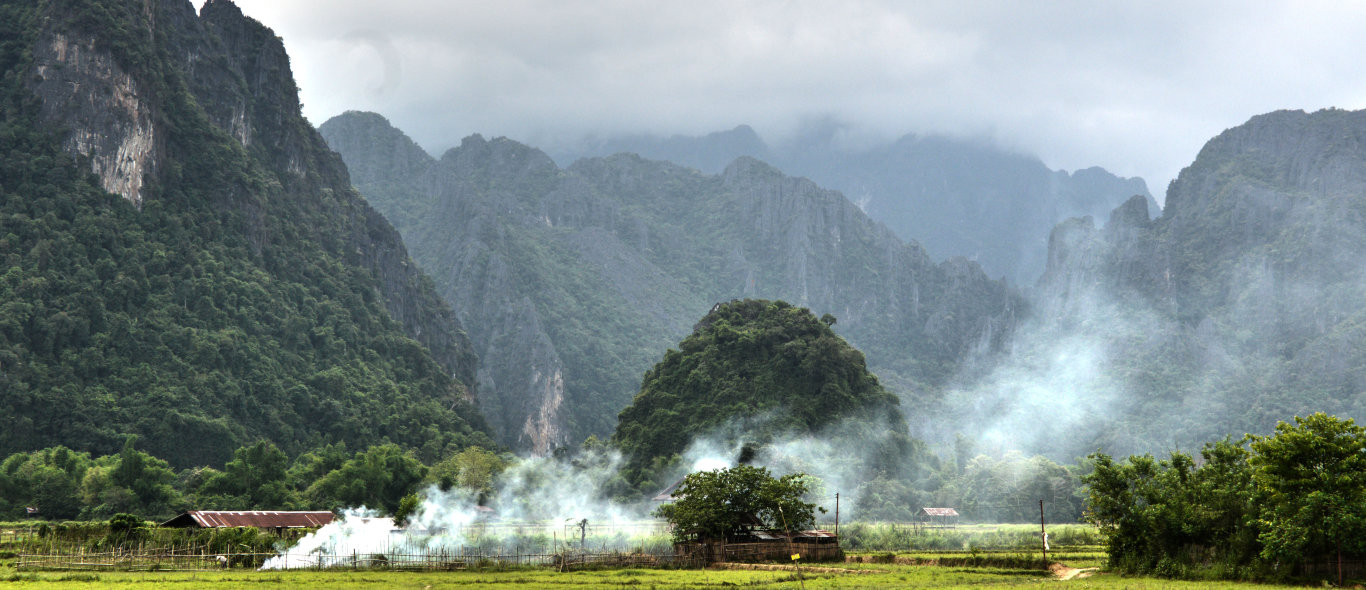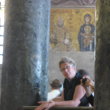
Vang Vieng
Motorcycle memories
Motorcycle memories
Three weeks ago on our holiday in Laos, we decided to hire motorcycles to explore the rural surroundings of Vang Vieng. We also decided not to wear helmets, despite of the fact we were fully aware that we’d be heading down bumpy dust roads. Our tour leader Aom was terrified but we had a childish belief nothing would happen to us, and it didn’t. Once on the motorbike, all sorts of memories of our first stay in Bangladesh came back to me.
First movie – in Bangladesh
The first time I went to the cinema was in Kurigram with chacha Malek. I must have been 5 or 6 years old, it was somewhere in the mid eighties. Chacha Malek was the counterpart of my father, and we called him chacha which means ‘uncle’ in Bengali. My parents got along very well with this integer and intelligent man, who as a Muslim once called my mother ‘didi’ [sister].
Chacha Malek would occasionally take me or me and my eldest brother Erik for a motorbike tour in the weekend. And he’d stuff us with misthi and moori [misthi are bread balls in sweetened milk (in Bengali ‘mishti’ means sweet) and ‘moori’ is puffed rice with a savoury flavour].
During these trips we’d got to see a lot of Kurigram, which lies in the North-East of the ‘head’ of Bangladesh. Kurigram means ‘twenty villages’ and is situated in a completely rural, flat area on the joint of the Teesta and the Jumina river. I remember seeing chunks of earth fall into the river and men trying to fortify the land, wearing muddy sand in baskets on their heads. (Ohh, imagine all that water now, when climate change has become a real threat to a country as Bangladesh – check out Simon Reeve’s documentary ‘Tropic of Cancer’) .
So one afternoon chacha Malek took me to the movie. I remember it was particularly hot in the cinema room, probably there were no fans and obviously no windows for fresh air. And air conditionings would enter the scene only years later. On the canvas, there was a strong man who was consoling weeping women and then drove circles around a fountain with his motorcycle. The man had medium length thick black hair and was a bit too fat. I had just seen a typical Bollywood movie, I reckon.
Grandfather and uncle Maarten
When living abroad, family members would visit us now and then. Grandfather Wolting truly enjoyed these trips and during their stay in Kurigram he made a full study of the local fisherman’s nets. He actually built one himself for our fishing pond in our backyard.
Grandfather Wolting once joined my father on a field trip, sitting at the back of my father’s motorcycle and making their way across the incremented walkways that separated the rice fields. He must have been in his early seventies – when I sat on that motorcycle in Laos I realized what a marvel it should have been for the man. But also for my father, who set out for advising farmers about “extensive or intensive agriculture” at least once a week. I guess that was my father at his best, he never liked desk work at all.
My uncle Maarten also visited us in Bangladesh. He and his former wife brought us presents, such as a red poetry album in which one lets friends write personal wishes. They also brought us a poster of Bert and Ernie, Sesame street figures that I wasn’t really familiar with at the age of 5 or 6. I know that uncle also looks back with a lot of pleasure to have joined a field trip with my father.
Staff picnic
The last motorbike memory I will share in this blog is about a staff picnic. RDRS was the project my father and chacha Malek worked for in Kurigram.
I don’t know if these occasions were annual or more frequent, but once in a while there would be a staff picnic. It always included a lot of food, just as the “functions” we had on the tennis court in front of our house. These functions usually were to celebrate the introduction or leave of expatriates. A stage was built on the tennis court, ornated along the sides with women’s saris. Before the function, we sat with dozens of others on the concrete of the tennis court, eating ‘bhat o dahl’ [rice with lentil sauce] from banana leafs and trying to cover the leaf as hard as possible when we had had enough. The ladies that divided the food didn’t take “no, donyabad [thank you]” as an answer. Before the function, I also would get fancy dotted patterns on my hands and on my face, like all the other women. And during the celebration itself there were (lengthy) speeches and colourful songs accompanied by the typical hand organ.
Okay, about the staff picnic. The whole group of thirty to fifty persons set out to cross the river Jumina, which in itself always was a happening. The crossing would be on small long boats, with a boats man putting a bamboo stick down in the river soil at the front of the boat and making his way to the end of the boat, thus pushing the boat forward. Incredible, if you come to think about it.
Our destination was Rowmari, another one and a half hour drive. In my memory we did the first part in a Jeep and the rest on a motorcycle, but this is a bit blurry. It was dry season, so we sat in a field for lunch. The usual ‘bhat o dahl’ and probably some eggs, hard boiled so when peeling off the skin, the egg yolk had turned out to be blue. At a certain point during the picnic, I was strolling along the field, there were flowers and insects that I was studying. Then somebody called me: “Yonika! You have to come back, because you are in India now!”.
